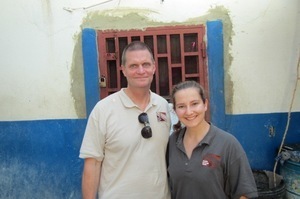
Notre Dame alumnus Dr. John May ND ’84 switched his major from engineering to preprofessional studies when he was inspired by the story of physician-humanitarian alumnus Dr. Tom Dooley. Later, he earned an M.D. at Loyola-Stritch School of Medicine in Chicago, and dedicated his career to providing medical care in jails and prisons, both in the United States and around the world. He founded Healing through Walls in 2001 in Haiti, where the organization now has 50 medical professional employees working in prisons. Healing through Walls also operates in the Dominican Republic, Jamaica, Malawi and the Congo and consults across the Caribbean and Africa.
May, a member of Notre Dame’s Dooley Society for alumni who are medical professionals, gave a talk to the Compassionate Care in Medicine Club recently. Alexis Doyle, a junior biological sciences and international peace studies major who is co-president of the club and visited the work in Haiti last summer, co-organized the talk.
May, who is Chief Medical Officer for Armor Correctional Health Services of Miami, a private firm that provides medical services in jails and prisons in eight states, has visited Haiti nearly every month for 14 years. Six hundred prisoners diagnosed with HIV and 300 diagnosed with tuberculosis are receiving treatment through the program–none were given care before 2007. The volunteer organization, which receives donations and grants including funding from the U.S. Agency for International Development, has established electronic medical records for each prisoner, a full pharmacy, a sophisticated laboratory, cervical cancer screening for women, peer education training on disease, health, and prevention, Boy Scouts in the juvenile prison, mental health services, and a digital X-ray machine that screens each prisoner for tuberculosis. It recently started a clinic for former prisoners and partners of prisons.
Healing through Walls operates in six of Haiti’s 16 prisons and visits the others for screening and care. The largest prison, built for 800 prisoners, now holds 4,600. Crowded, hot, unsanitary conditions increase the risk of the spread of infectious diseases, and untreated prisoners could carry them back to their communities when they are released. “If we don’t take care of prisoner health, we’ll never be successful with community health,” May says. “There’s really some desperate situations not only in Haiti but in many of these low-income countries. The needs are tremendous, and we can be very effective.”
Originally published by Gene Stowe at science.nd.edu on March 14, 2016.